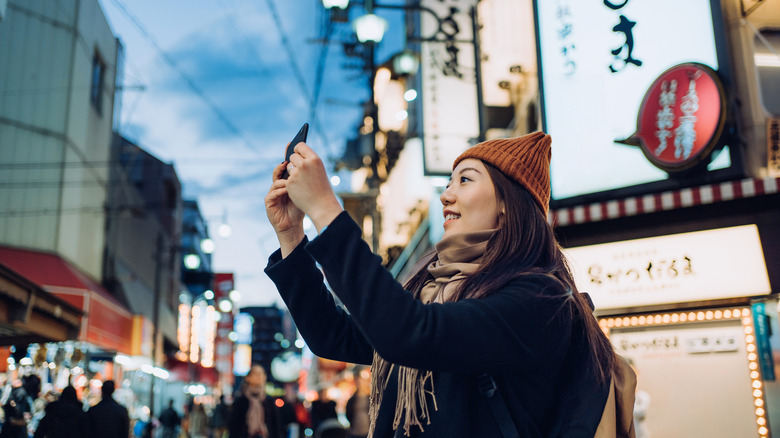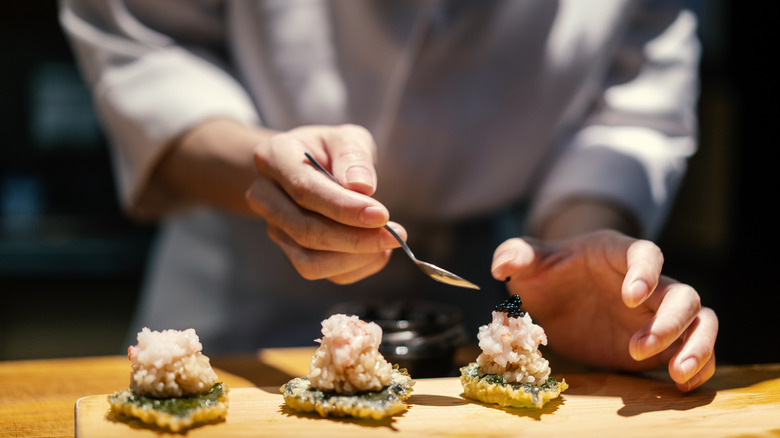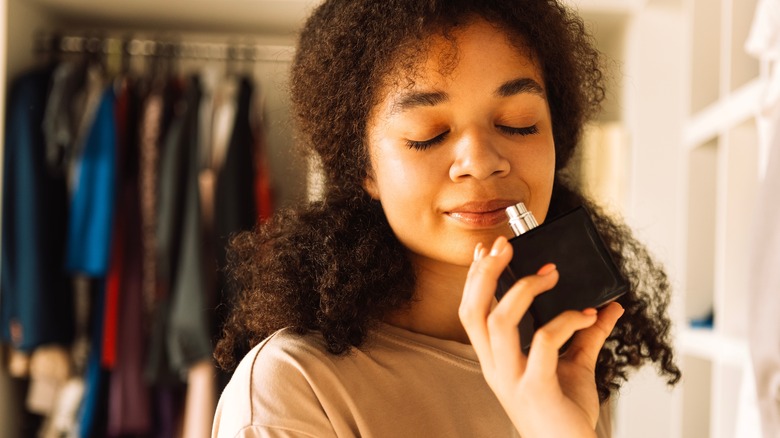Why You Should Just Avoid Bringing Perfume On A Trip To Japan
Travelers can show their respect for the countries they visit by taking the time to learn about local customs prior to their arrival. Japan, in particular, has multiple traditions you should keep in mind during your trip. While you may know not to leave chopsticks upright in food, particularly rice, due to its associations with death and funerals, other social rules may have flown under your radar. For instance, you should prepare to hold onto your trash in Japan due to the country's lack of trash cans, refrain from eating and drinking while walking, and avoid public displays of affection. The Japanese also tend to frown on wearing strong perfume in public.
While cosmetics and skincare consistently hit high sales numbers in Japan, it has one of the smallest fragrance markets in the world. Though people sometimes wear light fragrances, you'll want to play it safe to avoid contributing to "sumehara" or "smell harassment" in the country. The issue extends beyond perfume, encompassing fabric softeners, lotions, and even cigarette smoke.
You may love the scent you wear; however, you should probably leave it at home before heading to Japan. Think of it as just another aspect of living in a society, much like showing consideration for the scent-sensitive by skipping a spritz of fragrance before boarding a plane, heading to the theater, or entering an office. However, the Japanese avoid perfume in most situations where they will encounter other people, with one scenario — eating at a sushi restaurant — standing out.
Strong fragrances can ruin the sushi experience
In Japanese culture (and many others), the scents of the dishes served play a major role in the dining experience. If you've ever lost your sense of smell, due to COVID-19, allergies, or a cold, you know that food tends to taste different. Scent makes up around 80 percent of taste; lacking the ability to smell limits you to salty, sweet, bitter, sour, and umami (or savory) flavors. You may have walked through a department store perfume section in the past and felt like you could taste the strong scents. There's a good reason for that: As we chew our food, air goes through our nasal passages. Receptor proteins in the nose then combine with the food taste to create flavor.
As a result, perfume may impact the delicate scent of sushi and other foods, changing the flavor and damaging the experience. Due to this, some sushi restaurants have even banned strong perfumes in the dining room. "Those ambient scents definitely can affect the taste of the food and mood," Professor Charles Spence, a psychologist at the University of Oxford, explained to The Guardian. "It's a bit ambiguous, when you smell something, what your brain is going to attach it to. Is it the waiter, is it the restaurant, is it the food?"
Strategies for wearing perfume in Japan
If you cannot live without your scent while in Japan, you have a few options. First, familiarize yourself with the scent strength hierarchy. You'll want to forgo parfum, which has the most potent scent concentration. Eau de parfum is the next strongest, followed by eau de toilette, eau de cologne, and eau fraîche at the lightest end. Perfume oils also pack quite a punch, so don't bother with those. Stick with options that have the least intense smell.
If you wear perfume for your own enjoyment, try a different application method to avoid bothering the people around you. Rather than spraying or dabbing the scent directly on your skin, apply it to the tip of a cotton swab and lightly press it under your nose ("lightly" is the crucial word here). If you have a travel companion, ask if they can smell the perfume before you leave your accommodation.
If you've made a mistake and put on too much perfume during your Japan vacation, take steps to dampen the smell. First, you can dip a cotton ball or pad in rubbing alcohol and wipe down the spot where you placed the perfume. It won't go away, but it can lighten it a bit. You can also try unscented baby wipes or spread unscented lotion over the area. Finally, applying unscented deodorant to the spot can help as well.


